Demolition Contractors Jefferson
Find Building Demolition in Jefferson
Get multiple Demolition Companies quotes for your project today! Compare profiles, reviews, accreditations, portfolio, etc... and choose the best offer.

Coastal Grading & Rental Inc
46 reviews1245 Sand Hill Rd, Guyton, GA, 31312, USTo Our Customer's Coastal Grading is committed to providing the highest quality, value-added site preparation services to our coastal Georgia and South Carolina customers. We believe that by creating a successful partnership with our customers throughout the project process, we can exceed their expectations and gain their trust. We pledge to do this through the exceptional performance of every member of the Coastal Grading team. The Short Version Of Our Story Founded in 1981 by Gerald Odom, Coastal Grading began with a modest start. After 10+ years working as a foreman with local asphalt paving companies, Gerald start Coastal Grading and Rental with a pickup truck, a backhoe and a trailer. Gerald’s hard work and integrity paid off quickly growing the company to one of the most highly respected site-work contractors in the Low Country. It became a common theme in the Savannah Market that “no one could out work Gerald Odom”. His dedication set the bar for everyone that joined the Coastal Grading Team. Coastal Grading has provided a wide variety of site-work services throughout the Low Country over the past 40+ year; everything from truck yard maintenance to large warehouse construction. Colonial Terminals yard maintenance, SCAD Ronald C. Waranch Equestrian Center, Ellis Square and Underground Parking Garage, SCAD’s Sands at One West Victory, Benedictine Military School Parade Ground, are only a few of the successful projects of Coastal Grading’s long esteemed history. Gerald’s most successful achievement was building the best commercial grading team in the Savannah Market. After over 50 years in the commercial construction business, Gerald Odom turned over the reigns to Brian Hussey. A well-known, well-respected local businessman, whose father was Roy Hussey, founder of Hussey-Gay-Bell Engineering firm. Brian came “full circle” from holding a survey rod during summer jobs with Hussey-Gay-Bell to owning a civil construction company. It is well known in the commercial construction arena in the Low Country, if you want it done right, hire Coastal Grading. Get To Know Our Team After 40 years of successful leadership in the Site Preparation Industry, Gerald Odum has “passed the torch” to Brian and CG Partnership LLC. Brian brings a unique combination of talents and experiences to his role as the new leader of Coastal Grading including organizational and financial expertise, a strong work ethic, and a commitment to customer satisfaction. Brian is a proven leader with a passion for the construction industry and a deep understanding of the needs of our customers.
- Services
- Why Us?
- Our Team
- Testimonials
- Gallery
Get Quote- C
C W Earthworks
52 reviewsSavannah, USFacebook is a social networking service and website launched in February 2004, owned by Meta Platforms. It is the largest social network in the world, with over 2.91 billion monthly active users as of the first quarter of 2023. Users can create a personal profile, add other users as friends, and exchange messages, photos, and videos. Facebook is also used by businesses to connect with customers and promote their products and services.
- Services
- Why Us?
- Gallery
Get Quote 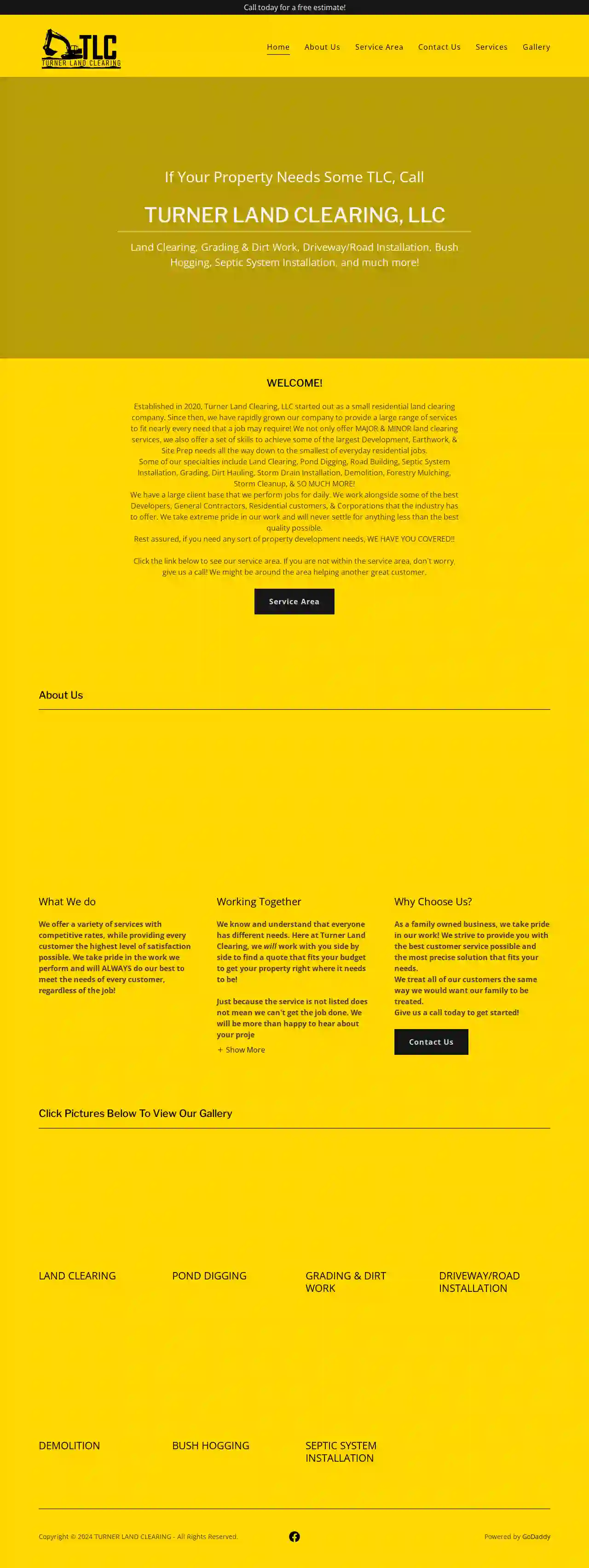
Turner Land Clearing, LLC
52 reviewsTownsend, GA, 31331, USAbout Turner Land Clearing, LLC Established in 2020, Turner Land Clearing, LLC began as a small residential land clearing company. Since then, we've expanded rapidly to offer a wide range of services, catering to almost any project need. We specialize in both major and minor land clearing, and we possess the skills to handle large-scale development, earthwork, and site preparation projects, as well as smaller everyday residential jobs. Our expertise encompasses Land Clearing, Pond Digging, Road Building, Septic System Installation, Grading, Dirt Hauling, Storm Drain Installation, Demolition, Forestry Mulching, Storm Cleanup, and much more! We work with a diverse client base, including Developers, General Contractors, Residential customers, and Corporations, and we take immense pride in our work, always striving for the highest quality. If you have any property development needs, we've got you covered! Check out our service area below. If you're outside the service area, don't hesitate to call us. We might be nearby assisting another satisfied customer.
- Services
- Why Us?
- Gallery
Get Quote
Batson-Cook Company
420 reviews2859 Paces Ferry Road SE, Suite 200, Atlanta, 30339, USAbout Batson-Cook Construction Batson-Cook Company is a Georgia-based firm that has been in business for more than a century under the same name. The company was founded in 1915 by Mr. W. C. Batson and Mr. Edmund F. Cook in West Point, Georgia, where it began operations in textile and mill village construction. Batson-Cook continued to expand operations over the next few decades and became recognized as one of the premier construction organizations in the southeastern United States. In 1957, the company opened its first regional office in Jacksonville, Florida, followed in 1959 by another in Atlanta, Georgia. A third construction office was established in West Point, Georgia, in 1977. Mr. Edmund C. Glover, third generation of the founding families, became president in 1982 and chairman and CEO in 1994. Under Mr. Glover’s leadership, the company opened a fourth regional office in Tampa, Florida, in 1983. In early 1997, Mr. Raymond L. Moody, Jr., became president and COO to direct the company’s progress. Mr. Moody was named Mr. Glover’s successor as CEO in December of 2008. In January, 2012, Mr. R. Randy Hall, formerly senior vice president and general manager of the Atlanta office, became president of Batson-Cook Company and steers the operations and forward progress of the company. On January 10, 2008, Batson-Cook became a wholly-owned subsidiary of Kajima USA. As is KUSA’s intent, Batson-Cook operates as an independent entity, just as it has for the last century. Batson-Cook’s expertise as a general contractor, construction manager, and design-build contractor spans almost every major industry throughout the Southeast, including the education, healthcare, hospitality, office, retail, multi-family residential, industrial, and religious building sectors. Batson-Cook Construction Core Values We care about people and results. We care about people, all people; our Batson-Cook colleagues, our clients, and our trade partners. We care about their safety and the positive results from the work that we do together. We are passionate. We believe passion is the fuel that produces excellence and we encourage enthusiastic behavior. We always strive to do the right thing. We believe that honesty and integrity are pillars of success and when faced with tough decisions we should always do the right thing. We do what we say we are going to do. We embrace accountability and take responsibility for our work. We take pride in doing what we say we are going to do.
- Services
- Why Us?
- Testimonials
- Gallery
Get Quote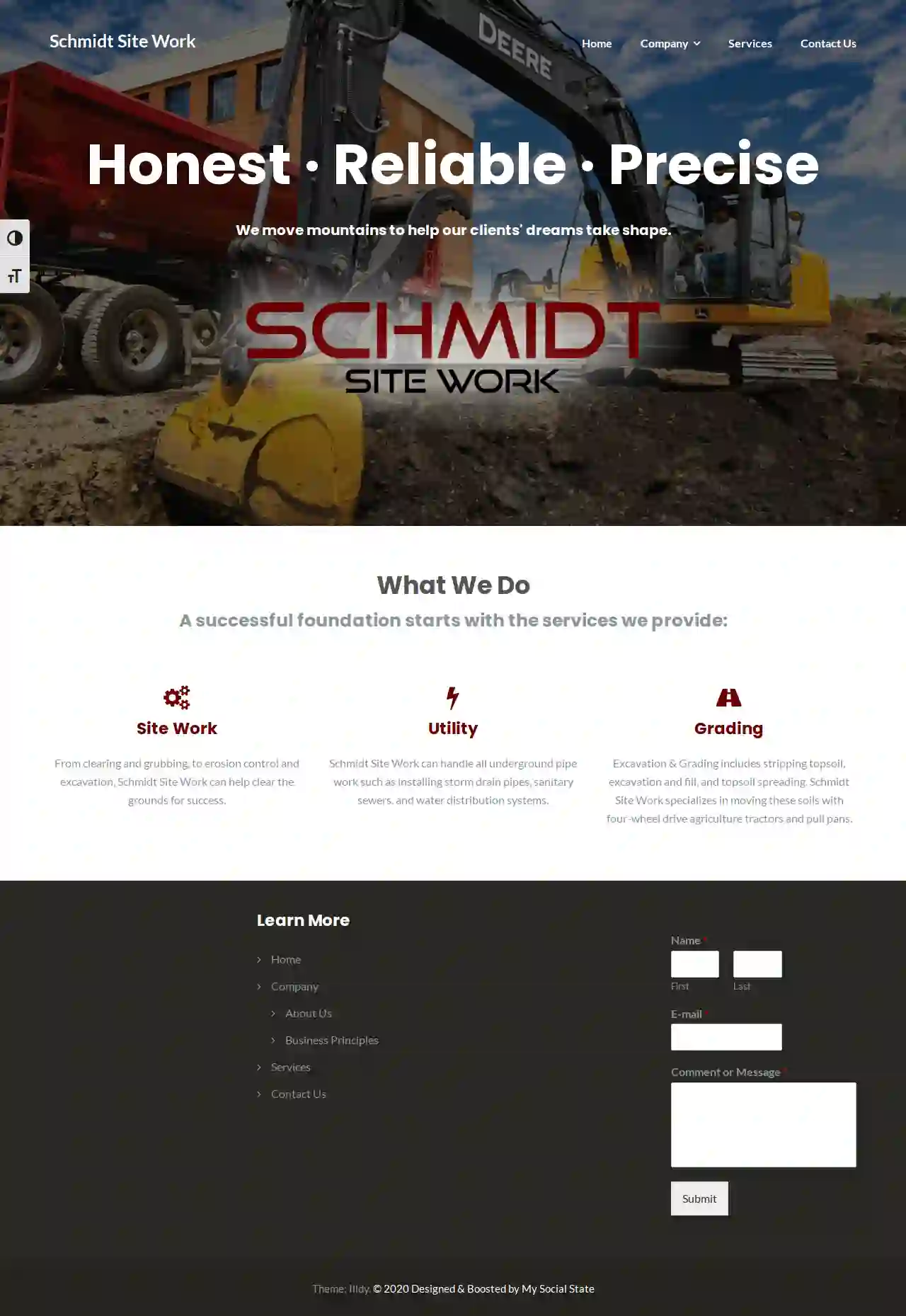
Schmidt Site Work
53 reviewsAugusta, USSchmidt Site Work's mission is to provide the highest-quality workmanship possible in the Augusta Georgia area. We succeed at this because of the integrity of our staff and subcontractors, our commitment to a solid work ethic, and our passion for staying current with the newest innovations of our industry, with consideration for the environment.
- Services
- Why Us?
- Gallery
Get Quote
Ground Control Landworks
54 reviewsGround Control Landworks, Covington, 30014, USGround Control Landworks: Your Trusted Land Management Experts Ground Control Landworks is a leading land management company in Covington, Georgia, specializing in a wide range of services designed to transform your land into the vision you have in mind. For over a decade, we've been providing clients with quality excavating services, earning a reputation for reliability, professionalism, and customer satisfaction. We understand that land management projects can be complex, and we're committed to handling every challenge with honesty and expertise. Whether you need land clearing, brush clearing, stump removal, site preparation, or excavating services, our team is equipped to handle it all. We're your one-stop shop for all your land management needs, ensuring your project is completed efficiently and to the highest standards. At Ground Control Landworks, we prioritize your satisfaction. We're dedicated to providing clear communication, competitive pricing, and a commitment to exceeding your expectations. Contact us today to discuss your project and let us help you achieve your land management goals.
- Services
- Why Us?
- Gallery
Get Quote
Ace Grading
4.216 reviewsRural Route 1, Box 3470-C, Ava, 65608, USAt Ace Grading, Land Clearing and Utility Installations, LLC, we pride ourselves on being a reliable and trustworthy partner for all your land clearing and utility installation needs. With over 40 years of experience in the construction industry, our team is dedicated to providing top-notch services that meet the highest standards of quality and customer satisfaction. Our services include brush and land clearing, foundation digs and concrete slabs, driveway grading and gravel, fence row, hunting trail and range, general site improvements, outdoor horse arenas, pasture reclamation, pond excavation, road clearing, mobile home site work, new septic systems, new storm shelters, tree and stump removal, and utility trenches for electric, water, and sewer. We serve customers in Christian, Douglas, Greene, Ozark, Polk, Taney, Webster, and Wright counties, and our team is committed to providing personalized attention to each project, ensuring that every customer receives the best possible service. At Ace Grading, Land Clearing and Utility Installations, LLC, we understand the importance of reliability, quality, and customer satisfaction. That's why we offer free estimates in writing, are licensed and insured, and have an A+ rating with the Better Business Bureau.
- Services
- Why Us?
- Accreditations
- Our Team
- Gallery
Get Quote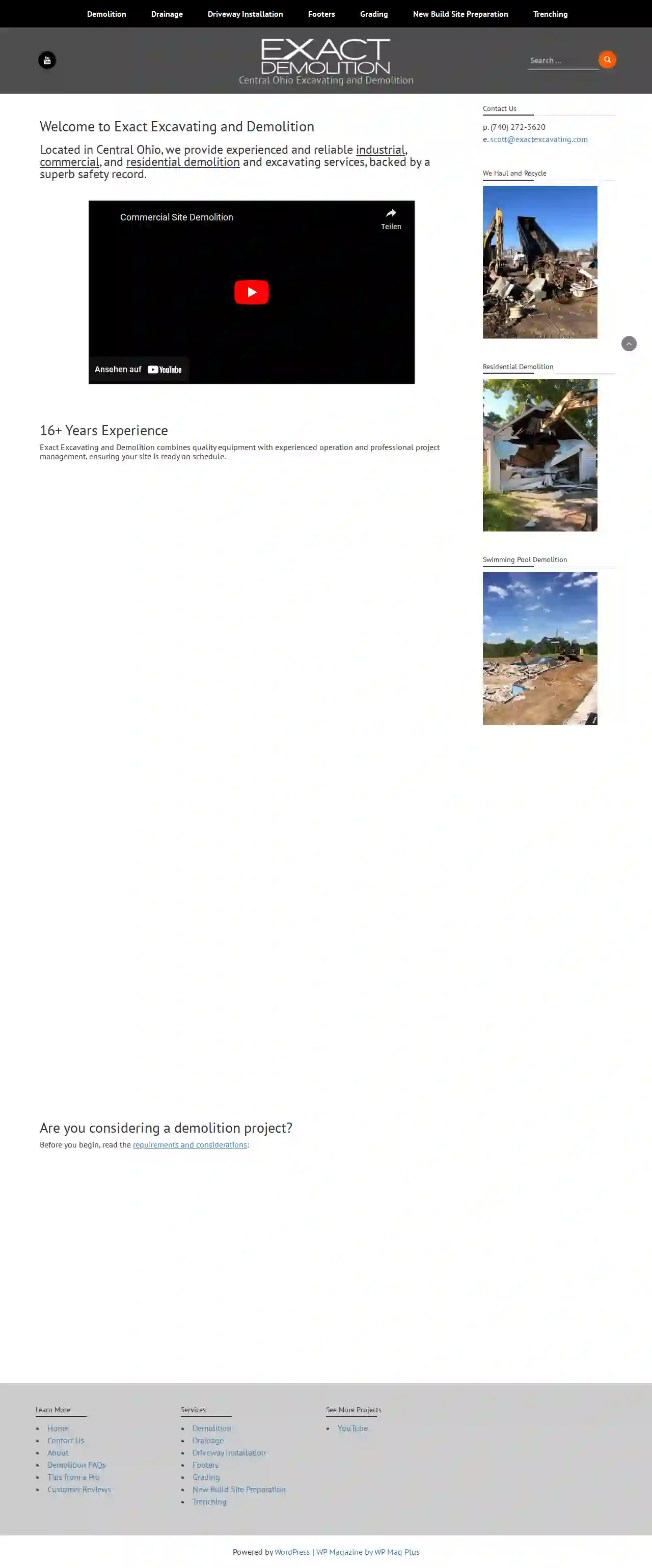
Exact Excavating and Demolition, LLC
4.715 reviewsColumbus, USWelcome to Exact Excavating and Demolition Located in Central Ohio, we provide experienced and reliable industrial, commercial, and residential demolition and excavating services, backed by a superb safety record. Exact Excavating and Demolition combines quality equipment with experienced operation and professional project management, ensuring your site is ready on schedule.
- Services
- Why Us?
- Gallery
Get Quote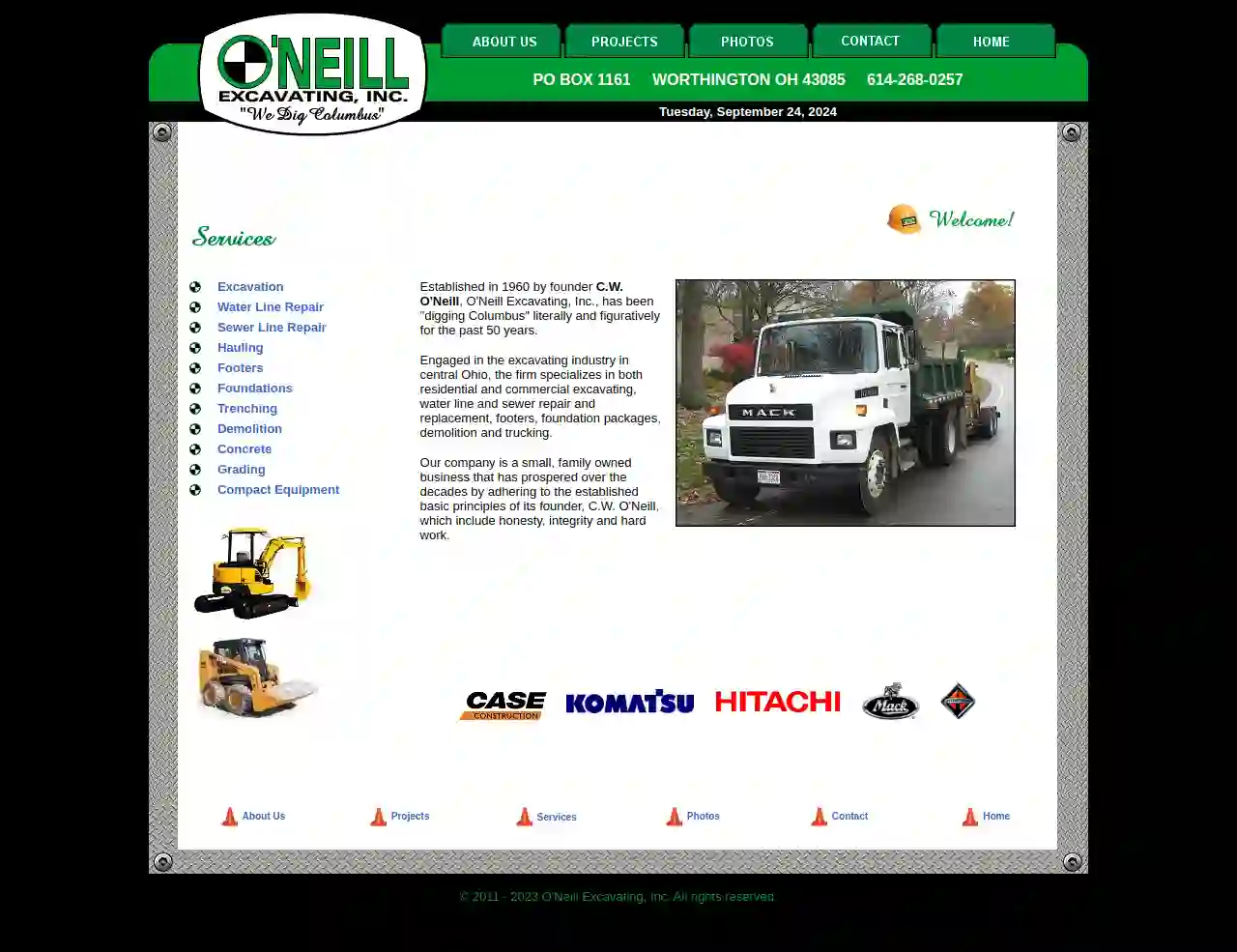
O'Neill Excavating Inc
PO Box 1161, Columbus, 43085, USO'Neill Excavating: A Legacy of Quality and Experience Established in 1960 by founder C.W. O'Neill, O'Neill Excavating, Inc., has been "digging Columbus" literally and figuratively for over six decades. A family-owned and operated business, we've built a reputation for honesty, integrity, and hard work, just like our founder envisioned. We're proud to serve both residential and commercial clients in central Ohio, offering a wide range of services including excavation, water line and sewer repair, foundation packages, demolition, and trucking. Our team of experienced professionals utilizes the finest equipment to ensure every project is completed to the highest standards. From our humble beginnings with a Henry backhoe, we've grown to a fleet of twelve pieces of heavy equipment, all while maintaining the same commitment to quality and customer satisfaction that C.W. O'Neill instilled in us. We're dedicated to providing our clients with the best possible experience, from the initial consultation to the final cleanup. Whether you're building a new home, adding a room, or simply need some excavation work done, O'Neill Excavating is the team you can trust. Contact us today to discuss your project and see how we can help you achieve your goals.
- Services
- Why Us?
- Our Team
- Gallery
Get Quote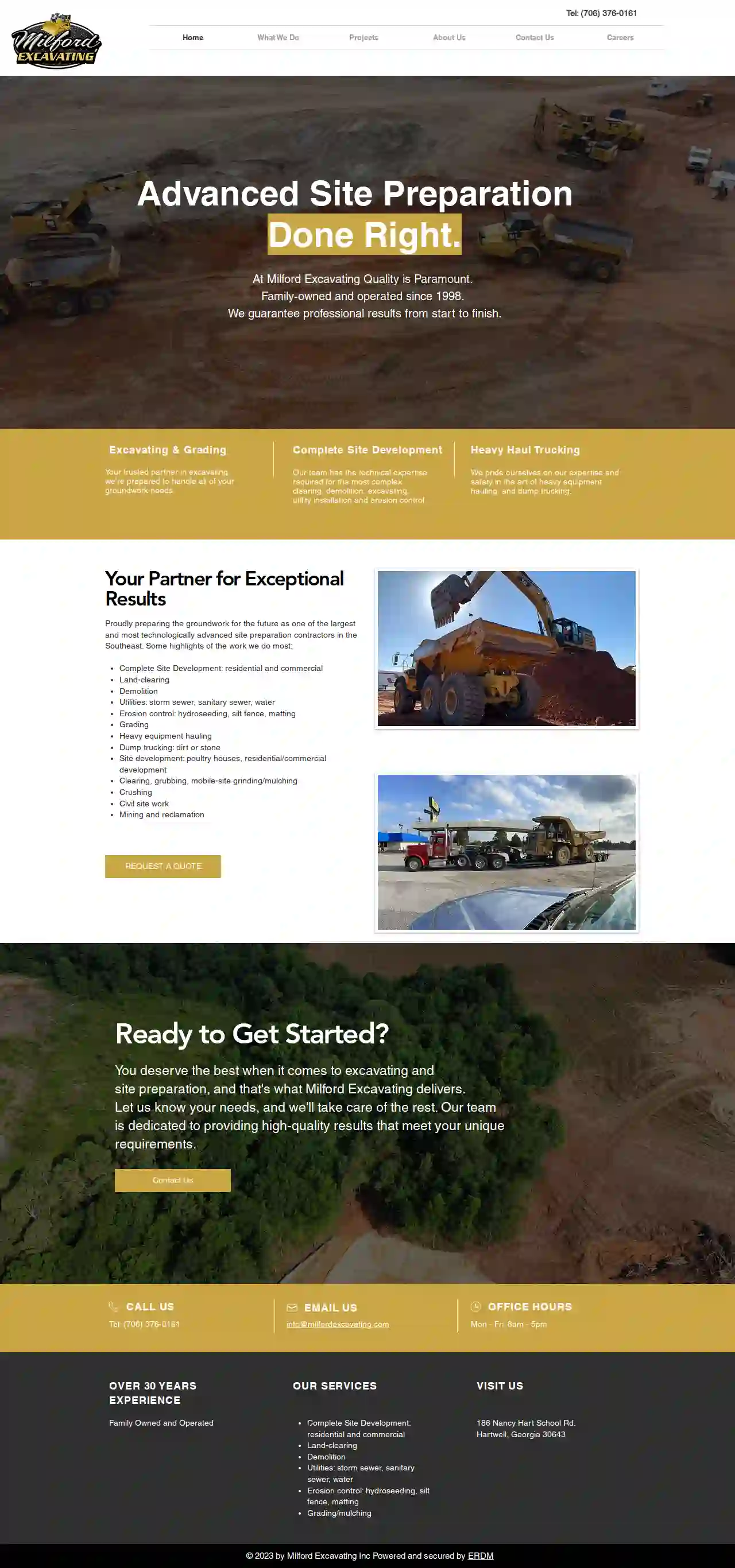
Milford Excavating, Inc.
45 reviews186 Nancy Hart School Rd., Hartwell, 30643, USAdvanced Site Preparation Done Right. At Milford Excavating Quality is Paramount. Family-owned and operated since 1998. We guarantee professional results from start to finish. Excavating & Grading Your trusted partner in excavating, we're prepared to handle all of your groundwork needs. Complete Site Development Our team has the technical expertise required for the most complex clearing, demolition, excavating, utility installation and erosion control. Heavy Haul Trucking We pride ourselves on our expertise and safety in the art of heavy equipment hauling, and dump trucking. Your Partner for Exceptional Results Proudly preparing the groundwork for the future as one of the largest and most technologically advanced site preparation contractors in the Southeast.
- Services
- Why Us?
- Gallery
Get Quote
Over 22,076+ Excavation Pros on our directory
Our excavation contractors operate in Jefferson & surroundings!
ExcavationHQ has curated and vetted Top Excavation Contractors in and around Jefferson. Find a top & trustworthy contractor today.
Frequently Asked Questions About Demolition Contractors
- Project Assessment: The demolition contractor evaluates the structure, site conditions, and project requirements.
- Permitting: Obtain necessary demolition permits from local authorities.
- Site Preparation: Secure the site, disconnect utilities, and remove any valuable or reusable items.
- Hazardous Material Abatement: Professionally remove asbestos, lead paint, or other hazardous materials if present.
- Demolition: Execute the chosen demolition method, bringing down the structure safely and efficiently.
- Debris Removal and Site Cleanup: Sort, process, and dispose of demolition debris responsibly. Clean up the site to prepare it for future use.
- Waste Generation: Demolition generates a large volume of debris, contributing to landfill space and potentially releasing harmful substances into the environment if not disposed of properly.
- Air Pollution: Dust and particulate matter released during demolition can impact air quality, affecting human health and the environment.
- Noise Pollution: Demolition activities can generate significant noise, disturbing nearby residents and wildlife.
- Resource Depletion: Demolition consumes resources that could be salvaged and reused, contributing to resource depletion and environmental degradation.
How do I find demolition contractors near me?
What are the steps involved in a typical demolition process?
What are the environmental impacts of demolition?
Can I do demolition myself?
How do I find demolition contractors near me?
What are the steps involved in a typical demolition process?
- Project Assessment: The demolition contractor evaluates the structure, site conditions, and project requirements.
- Permitting: Obtain necessary demolition permits from local authorities.
- Site Preparation: Secure the site, disconnect utilities, and remove any valuable or reusable items.
- Hazardous Material Abatement: Professionally remove asbestos, lead paint, or other hazardous materials if present.
- Demolition: Execute the chosen demolition method, bringing down the structure safely and efficiently.
- Debris Removal and Site Cleanup: Sort, process, and dispose of demolition debris responsibly. Clean up the site to prepare it for future use.
What are the environmental impacts of demolition?
- Waste Generation: Demolition generates a large volume of debris, contributing to landfill space and potentially releasing harmful substances into the environment if not disposed of properly.
- Air Pollution: Dust and particulate matter released during demolition can impact air quality, affecting human health and the environment.
- Noise Pollution: Demolition activities can generate significant noise, disturbing nearby residents and wildlife.
- Resource Depletion: Demolition consumes resources that could be salvaged and reused, contributing to resource depletion and environmental degradation.